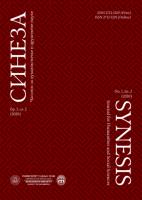Aktuelnost Fihteovog poimanja transcendentalnog Ja i psihološkog Ja za savremenu filozofiju duha
The topicality of Fichte's concept of transcendental ‘I’ and the psychological ‘I’ for contemporary philosophy of mind
Author(s): Andrija JurićSubject(s): Epistemology, German Idealism, Philosophy of Mind
Published by: Filozofski fakultet, Univerzitet u Banjoj Luci
Keywords: trancendental 'I'; self-consciousness; intellectual intuition; Tathandlung;Fichte;
Summary/Abstract: The author explores the place, role, and significance of the transcendental ‘I’ in Fichte’s Wissenschaftslehre, from a theoretical standpoint. It will be analysed through the ideas of an absolute, unconditioned principle, aresidue of abstraction and a product of a real (existing) activity, as well as through ideas of the ideel ray in the structure of consciousness, as a transcendental aspect in psychological consciousness, while the absolute ‘I’ will be interpreted as an activity of the spontaneity of mind, with the ‘I’ in reflection concluded. It will be shown to be, , on the one hand, pure, transcendental, and logicaland, on the other, as concrete and individual. Thanks to this dual nature, it enables self-consciousness as sui generis mode of consciousness, different from the objectifying consciousness, but, at the same time,, acting freelyas an agent. In the analysis of consciousness as consciousness, Fichte shows that unitary psychological (real) consciousness has structural elements that are necessary and objective; a transcendental structure. Only through those transcendental moments ‘I’, as a condition of possibility, a concrete psychological subject, comes into being. By differentiating between psychological consciousness and transcendental moments, Fichte also distinguishes between First and Third-person point of view. Unified, the kernel of psychological consciousness, the ‘I’, is transcendental. This interpretation of Fichte’s ideas aims to make them independent of German Idealism, and more accessible for analysis in the light of contemporary philosophy of mind and notions of consciousness. Thus, the result of the first section, ‘I’ as an unconditioned principle, can be interpreted epistemologically; a residue of abstraction has phenomenological connotations, while the ‘I’ as a real activity, contrary to factual knowledge, is an explicit distinction between consciousness and knowledge. The imperative indicates that psychological consciousness possesses its necessary form, which psychology alone cannot explicate; while the ideel ray represents an attempt to solve the problem of self-consciousness through form and structure alone. Furthermore,, in this respect, the absolute ‘I’ is not interpreted metaphysically or with connotations to idealism, but as a pre-differentiated activity and spontaneity of mind. In addition,, anotherconsequence is that consciousness should not be conceptualised only as a ‘state’ or ‘property’, but as a structure with unique form. The Heidelberg School of Self-Consciousness’ insistence on the fallibility of the reflection model puts Fichte’s potential solutions to this problem at the forefront of contemporary concepts of self-consciousness, as they are conceptualised either on reflection or objectifying consciousness, thus putting consciousness in the place of an object. Further explications of the importance of these ideas for the problems of egological and non-egological consciousness will be elaborated elsewhere.
Journal: Sineza
- Issue Year: 1/2020
- Issue No: 2
- Page Range: 47-71
- Page Count: 25
- Language: Serbian

